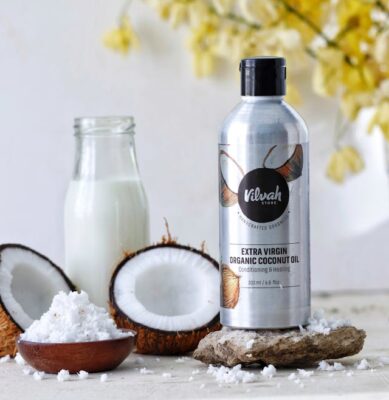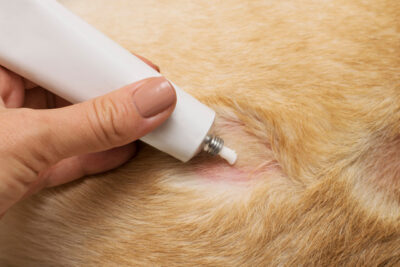Overview
Introduction to Coconut Oil for Dogs

Coconut oil has gained significant popularity in the world of pet care, particularly for its potential health benefits for dogs.
Known for its versatility and natural properties, coconut oil has become a staple in many households as a dietary supplement and topical treatment for pets. In this comprehensive guide, we delve into the benefits, uses, and precautions of coconut oil for dogs.
Whether you’re considering incorporating coconut oil into your dog’s diet or looking for natural remedies for common canine issues, this guide will provide you with valuable insights into the world of coconut oil for dogs.
What is Coconut Oil?
Coconut oil is a natural oil extracted from the meat of mature coconuts, which are the fruit of the coconut palm tree.
It is known for its high levels of saturated fats, particularly medium-chain triglycerides (MCTs) such as lauric acid, caprylic acid, and capric acid, which are believed to offer various health benefits. Long-chain triglycerides (LCTs) are also present in coconut oil.
Virgin coconut oil, also called unrefined coconut oil, is extracted from fresh coconut meat without undergoing chemical processing. This type of coconut oil is often preferred for its purity and potential health-promoting properties, making it a popular choice for use in dog care, known as dog coconut oil.
Benefits of Coconut Oil for Dogs
Coconut oil is a versatile supplement for dogs, offering a range of health benefits. It can improve skin and coat health, thanks to its moisturizing properties and the presence of lauric acid, which has antibacterial, antiviral, and antifungal properties.
When ingested, coconut oil supports digestive health by promoting a healthy balance of gut bacteria and aiding in nutrient absorption. Additionally, the medium-chain fatty acids in coconut oil can boost the immune system, helping dogs fight off infections and diseases.
Furthermore, coconut oil’s ability to promote satiety and boost metabolism may aid in weight management for dogs struggling with obesity.

Types of Coconut Oil
Virgin Coconut Oil
VCNO, also called virgin coconut oil, is one of the most popular types of coconut oil for dogs. It is extracted from fresh coconut meat without undergoing chemical processing, ensuring its purity and retaining its natural nutrients.
Cold-pressed coconut oil, a common method for extracting virgin coconut oil, involves pressing the coconut meat at low temperatures to preserve its beneficial properties. This type of coconut oil is often used in dog care for its potential health benefits.
Refined Coconut Oil
Refined coconut oil is another type of coconut oil that is commonly used for dogs. Unlike virgin coconut oil, refined coconut oil is processed using heat and chemicals to remove impurities and flavors.
This type of coconut oil is often more affordable than virgin coconut oil but may not retain as many of the natural nutrients.
Refined coconut oil can still be a beneficial addition to a dog’s diet or skincare routine, but it is important to choose a high-quality, food-grade product.
Organic Coconut Oil
Organic coconut oil is another type of coconut oil that is beneficial for dogs. It is extracted from coconuts that are grown without the use of synthetic pesticides, herbicides, or fertilizers, ensuring a higher level of purity.
Organic coconut oil retains its natural nutrients and is often considered a healthier option compared to non-organic varieties. This type of coconut oil is popular for use in dog care due to its potential health-promoting properties.

Using Coconut Oil for Dogs
How to Choose the Right Coconut Oil
When choosing coconut oil for dogs, it’s important to look for a product that is specifically labeled as safe for canine consumption.
Opt for coconut oil that is high in medium-chain saturated fatty acids, such as lauric acid, caprylic acid, and capric acid, as these are believed to offer health benefits for dogs. Ensure that the coconut oil is free from additives and is a pure, edible oil.
Look for terms like ‘food-grade’ or ‘edible oil’ on the label to ensure its suitability for your dog’s consumption.
Dosage Guidelines
When applying coconut oil topically to your dog’s skin or coat, start with a small amount and gradually increase as needed. For oral consumption, start by adding about half a teaspoon to your dog’s food and monitor for any adverse reactions.
Most dogs can safely eat coconut oil in moderation due to its beneficial saturated fats, but it’s always best to consult with your veterinarian regarding the appropriate dosage for your dog’s specific needs.

Methods of Administration
Oral
Coconut oil can be administered orally to dogs by mixing it with their food. Start with a small amount, such as half a teaspoon for small dogs and up to a tablespoon for larger dogs, and gradually increase the dosage as tolerated.
Some dog owners mix coconut oil with other oils, like salmon oil or fish oils, to enhance its palatability and provide additional health benefits. However, it’s important to monitor the saturated fat intake from coconut oil, especially for dogs with dietary restrictions or health conditions.
It’s also important to ensure that dogs eat coconut oil in moderation and that the coconut oil is safe for canine consumption. Proper pet nutrition includes monitoring the types and amounts of fats and oils in your dog’s diet, including coconut oil.
When giving coconut oil to your dog, be mindful of the dosage and any potential side effects. Adding coconut oil to your dog’s diet should be done gradually and under the guidance of a veterinarian, especially if your dog has any existing health issues.
Topical
Coconut oil can be applied topically to dogs to help alleviate dry skin, improve the condition of the coat, and promote overall skin health.
To apply, simply warm the coconut oil in your hands until it becomes liquid, then massage it into your dog’s skin or coat. Focus on areas that are particularly dry or irritated, such as paw pads or minor wounds.
Coconut oil is generally safe for dogs, but it’s always a good idea to monitor for any signs of allergic reaction, such as redness or itching, especially if your dog has sensitive skin.
Safety Considerations
While coconut oil is generally considered safe and beneficial for dogs, it’s important to be aware of potential safety considerations. Some dogs may experience stomach upset, greasy or loose stools, or weight gain if they consume too much coconut oil.
Additionally, some dogs may be allergic to coconut oil, so it’s advisable to introduce it gradually and monitor for any signs of allergic reaction. For overweight dogs, coconut oil can be a good addition to their diet, but it should be given in moderation to avoid excessive calorie intake.
Nutritional Value of Coconut Oil
Coconut oil is considered a beneficial addition to a dog’s diet due to its nutritional value. It contains medium-chain triglycerides (MCTs), which are a type of fatty acid that is easily digestible and can be a quick source of energy for dogs.
Additionally, coconut oil is safe for most dogs and is often used in dog care, known as dog coconut oil, for its potential health benefits. When given in moderation, coconut oil can be a good supplement to support your dog’s overall health and well-being.

Specific Uses for Coconut Oil
Skin Conditions
Coconut oil is often used topically to help improve skin conditions in dogs. Its antibacterial and antifungal properties can help soothe and moisturize dry skin, itchy skin, or irritated skin. Coconut oil is generally safe for dogs, but it’s important to monitor for any signs of allergic reaction.
To use, simply massage a small amount of coconut oil into your dog’s coat and skin, focusing on dry or irritated areas. Avoid leaving coconut oil on your dog’s fur for too long to prevent it from becoming greasy.
Digestive Disorders
Coconut oil can be beneficial for dogs with digestive issues such as upset stomach or bad breath. Its antiviral properties can help reduce harmful bacteria in the digestive tract, while its ability to reduce gut inflammation can promote overall digestive health.
When adding coconut oil to your dog’s diet, start with a small amount to ensure it agrees with their stomach. Coconut oil is generally safe and can be a good addition to support your dog’s digestive tract health.
Joint Health
Coconut oil can be used to support joint health in dogs, thanks to its anti-inflammatory properties. The medium-chain fatty acids in coconut oil can help reduce inflammation in the joints, potentially easing discomfort and improving mobility.
Adding coconut oil to your dog’s diet in moderation may help support their overall joint health, especially in senior dogs or those with arthritis.
Cognitive Dysfunction
Some pet owners believe that coconut oil may have benefits for cognitive dysfunction in dogs, although more research is needed to confirm these claims. The medium-chain fatty acids in coconut oil are thought to support brain health and function, which could potentially benefit dogs with cognitive issues.
While the purported benefits of coconut oil for cognitive dysfunction are promising, it’s important to consult with your veterinarian before adding it to your dog’s diet.

Incorporating Coconut Oil into Your Dog’s Routine
Recipes for Homemade Treats
Incorporating coconut oil into your dog’s routine through homemade treats can be a tasty and beneficial addition to their diet. Coconut oil is known for its several health benefits, including improving skin and coat health and supporting digestion.
However, it’s important to add coconut oil to your dog’s diet in moderation to prevent weight gain and to watch for any signs of allergic reactions. Here are some easy recipes for homemade treats that include coconut oil:
- Coconut Oil Dog Treats: Mix 1/2 cup of coconut oil with 1 cup of peanut butter and 2 cups of oats. Roll the mixture into balls and place them on a baking sheet. Refrigerate until firm.
- Coconut Oil and Banana Treats: Mash 1 ripe banana and mix it with 1/4 cup of melted coconut oil and 1 cup of oats. Drop spoonfuls of the mixture onto a baking sheet and bake at 350°F for 12-15 minutes.
- Frozen Coconut Oil Treats: Mix 1/2 cup of coconut oil with 1/2 cup of plain yogurt and 1 tablespoon of honey. Pour the mixture into ice cube trays and freeze until solid.
These treats can be a healthy and delicious way to add coconut oil to your dog’s diet and support their overall health.
Adding to Regular Meals
Incorporating coconut oil into your dog’s regular meals can be a simple and beneficial way to add extra nutrients to their diet. Coconut oil is generally safe and considered good for dogs in moderation.
Start by adding a small amount, such as a teaspoon for small dogs or a tablespoon for larger dogs, to their food and gradually increase the amount as tolerated. Mixing coconut oil with their regular meals can help support their overall health and well-being.

DIY Coconut Oil Dog Shampoo
Creating a DIY coconut oil dog shampoo can be a natural and beneficial way to improve your dog’s coat and skin health.
Coconut oil is known for its moisturizing properties, which can help nourish and hydrate your dog’s skin and coat.
To make a simple coconut oil dog shampoo, mix 1/4 cup of melted coconut oil with 1 cup of warm water and 1 cup of liquid castile soap.
Use this shampoo to gently cleanse your dog’s skin and coat, leaving the coconut oil on for a few minutes before rinsing thoroughly.

Selecting and Storing Coconut Oil for Dogs
Choosing the Right Coconut Oil
When selecting coconut oil for your dog, look for a high-quality, unrefined, virgin coconut oil that is organic and free from additives.
This type of coconut oil is often considered the best choice for its purity and potential health benefits.
Proper Storage to Maintain Freshness and Quality
To maintain the freshness and quality of coconut oil for dogs, it’s important to store it properly. Keep the coconut oil in a cool, dry place away from direct sunlight and heat sources.
Avoid storing coconut oil in the refrigerator, as it can become too hard to use; instead, store it at room temperature for easy access.
Summary Coconut Oil For Dogs
Recap of Benefits of Coconut Oil For Dogs
- Coconut oil offers a range of health benefits for dogs, including improved skin and coat health, support for digestive health, and a boost to the immune system.
- It contains medium-chain triglycerides (MCTs) like lauric acid, which has antibacterial, antiviral, and antifungal properties.
- Coconut oil can also aid in weight management by promoting satiety and boosting metabolism.
Final Thoughts on Coconut Oil for Dogs
Coconut oil can be a valuable addition to your dog’s diet and grooming routine, offering numerous potential health benefits. However, it’s important to use coconut oil in moderation and monitor your dog for any adverse reactions.
Always choose high-quality, food-grade coconut oil and consult with your veterinarian before making any significant changes to your dog’s diet or healthcare regimen. With proper use, coconut oil can be a natural and beneficial supplement for your furry friend.
If you’re looking for puppies for sale in Florida and surrounding areas, check out our thoughtfully bred puppies from reputable breeders.
Frequently Asked Questions (FAQs) About Coconut Oil for Dogs
- Q: Is coconut oil safe for dogs?
- A: Yes, coconut oil is generally safe for dogs when used in moderation. It contains medium-chain triglycerides (MCTs) like lauric acid, which have antimicrobial properties and can benefit a dog’s health.
- Q: Can coconut oil cause greasy stools in dogs?
- A: Yes, giving your dog too much coconut oil can lead to greasy stools. It’s important to introduce coconut oil gradually and monitor your dog’s response.
- Q: How can coconut oil benefit a dog’s skin?
- A: Coconut oil can be beneficial for a dog’s skin, as it has moisturizing properties and may help with dry or irritated skin. However, it’s important to be cautious and watch for any signs of allergic reactions.
- Q: Should I consult with a veterinarian before giving my dog coconut oil?
- A: Yes, it’s always a good idea to consult with a veterinarian before making any changes to your dog’s diet or healthcare regimen, including adding coconut oil.
- Q: Can coconut oil benefit human health as well?
- A: Yes, coconut oil is also popular in human health and is used in various ways, such as in cooking and skincare. However, the benefits for dogs and humans may differ, so it’s important to use coconut oil appropriately for each.
- Q: What is cold-pressed coconut oil?
- A: Cold-pressed coconut oil is extracted from fresh coconut meat without using heat, which helps to retain more of its natural nutrients and properties.
- Q: Can I leave coconut oil on my dog’s fur for too long?
- A: It’s best to avoid leaving coconut oil on your dog’s fur for extended periods, as it can become greasy and attract dirt.
- Q: How can I tell if my dog is having an allergic reaction to coconut oil?
- A: Signs of an allergic reaction to coconut oil in dogs may include itching, redness, or swelling. If you suspect an allergic reaction, stop using coconut oil and consult with your veterinarian.
- Q: Is coconut oil good for pet health overall?
- A: Coconut oil can be a beneficial supplement for pet health when used appropriately. However, it’s important to use it in moderation and watch for any adverse effects.




